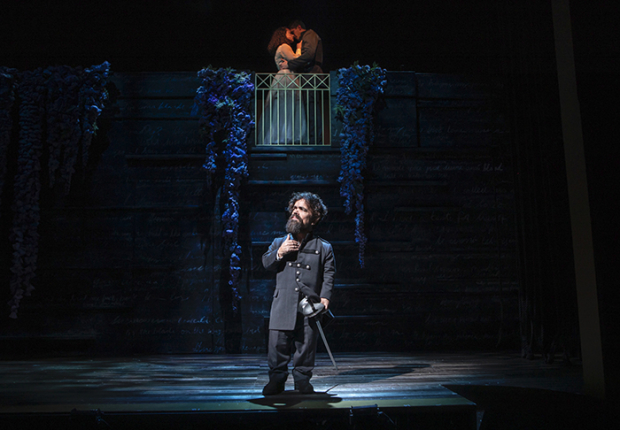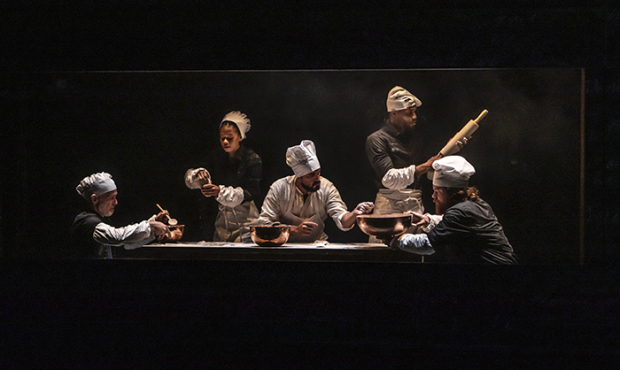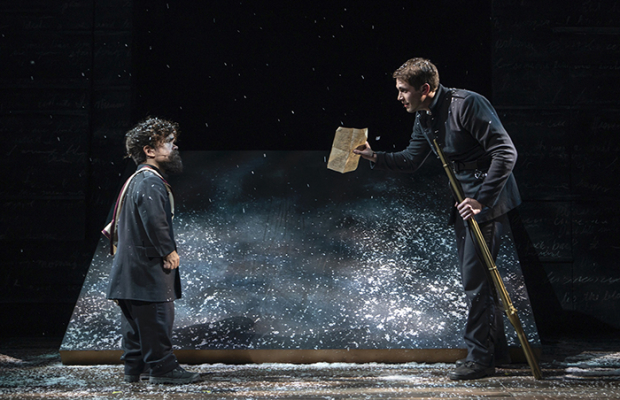Peter Dinklage Gives Cyrano a New Facade

(© Monique Carboni)
Every Game of Thrones fan who spent the better part of a decade getting to know Peter Dinklage as HBO royalty seems to be in agreement that the prideful and hopelessly romantic Cyrano de Bergerac is a perfect complement to the tormented Tyrion Lannister. Both are burdened by their facades and both are fortified by their intellects. Unfortunately, it feels as if their likeness was the only inspiration for Erica Schmidt's Cyrano, a musical adaptation of Edmond Rostand's classic play that pits soulful words of love against skin-deep affections.
That's possibly because the production's updates are only skin-deep as well. Instead of giving our titular soldier and poet his customary large nose, in this version, Cyrano's stature is the physical flaw that triggers his doubts when it comes to winning the heart of his beloved Roxanne (Jasmine Cephas Jones). Although we never really acknowledge that modification. We still point to Cyrano's nose as his fatal flaw, perhaps as a nod to the more diplomatic forms of ostracism we've developed over the past century, or perhaps just as a way for the musical to have a life beyond Dinklage (Schmidt's husband), who duly carries the show with brooding intensity.
Considering the scarcity of other alterations to the story, new insights into the politics of love and beauty don't seem to be the priority. Roxanne still falls for the beautiful but doltish Christian (Blake Jenner). Cyrano still diffidently agrees to ghostwrite love letters on Christian's behalf. And Roxanne still clings to her dubious claim that she only has love for souls, not pretty faces. So, filled with all the questions and contradictions of the original piece and a dreary score by the National's Aaron Dessner, Bryce Dessner, and Matt Berninger with Carin Besser, we're left with a musical without enough substance to justify its handsome package.

(© Monique Carboni)
And a handsome package it certainly has. Schmidt (who both adapts and directs) manifests Cyrano's poetic worldview in stage pictures that look like Baroque paintings. Jeff Croiter's delicate lighting brings out the earthy tones in Tom Broecker's nod to 17th-century period costumes and Christine Jones and Amy Rubin's simply designed set (centered around a large wall covered in lines of poetry), and a cutout window elegantly frames Jeff and Rick Kuperman's dreamlike choreography for the bakers at the shop where Cyrano and Roxanne have arranged a meeting (Waitress has some competition when it comes to dexterity with a wisp of flour).
All of these individual elements are aesthetically pleasing, but how they drive the larger story is a big unanswered question that highlights a pervasive lack of focus: Why, in the scene surrounding Roxanne's confession to Cyrano about her love for Christian, do we put such a spotlight on the bakers in the back room? And why, in a musical about the most mythologized love triangle in dramatic history, is the production's heftiest musical number given to nameless soldiers on a battlefield?
Dinklage does not have the vocal prowess to deliver any kind of typical 11 o'clock number, nor do the show's composers have a traditional musical-theater sensibility. But even a musical without belting or jazz hands needs to have a score that builds toward something and gives shape to the world around it — something a collection of meandering and monotone songs can't accomplish. And voices like Jenner's and Jones's (forever to be associated with Hamilton's Maria Reynolds) are terrible things to waste.
Jenner is a breath of fresh air as Christian — worthy of all the swooning Roxanne misguidedly sends his way. His simple handsome-soldier-in-love-with-a-beautiful-woman character, however, offers minimal confusion. Roxanne, on the other hand, is a conundrum that Jones has not quite worked out yet. She's a shrewd young woman, capable of tricking Count De Guiche (Ritchie Coster) into sparing Cyrano and Christian from battle. And yet she's not sharp enough to notice anything amiss about Christian before saying her wedding vows. As Theresa Rebeck had her fictional version of Sarah Bernhardt viciously comment about Roxanne in her play Bernhardt/Hamlet (which ran on Broadway this time last year), "She is just like a man. Blinded by a pretty fool with no soul."
You don't have to dig particularly deep to reach Roxanne's inconsistencies, but Schmidt's production skates over the top of them, piling on moments of brazenness as symbols of power and self-command instead of trying to dissect this classic character's ambiguities with fresh, modern eyes. To attempt the latter would certainly have been a challenge — possibly one with no satisfying solution — but it would at least have made this Cyrano a bit more on the nose.

(© Monique Carboni)











